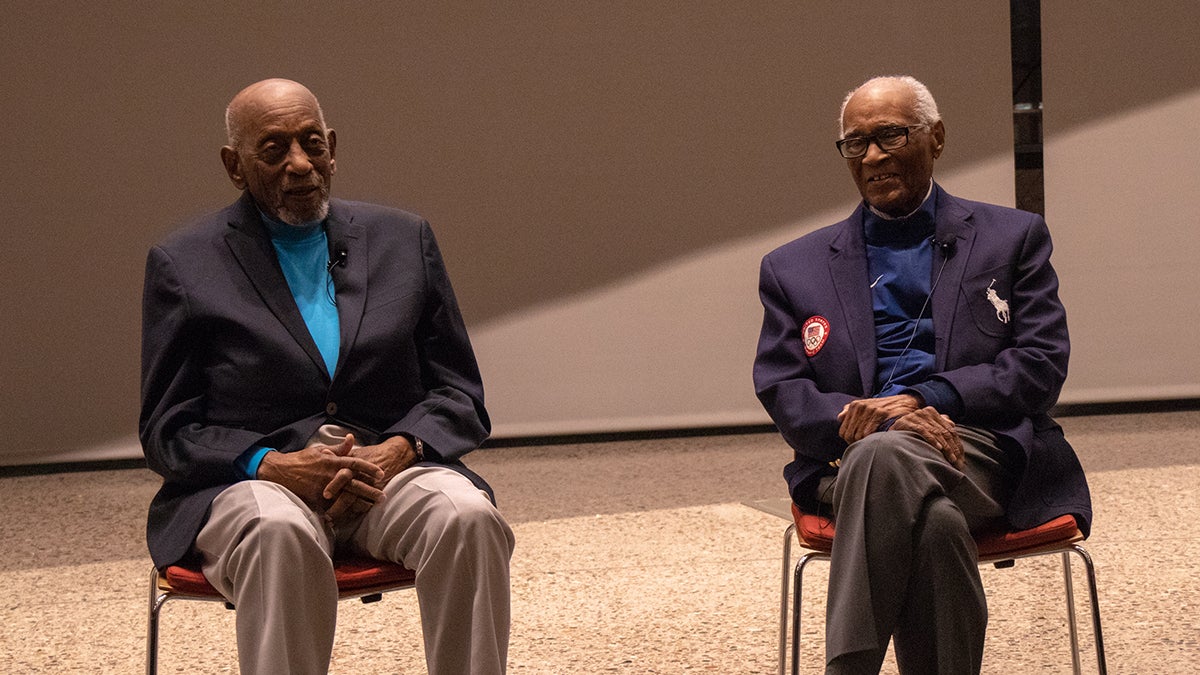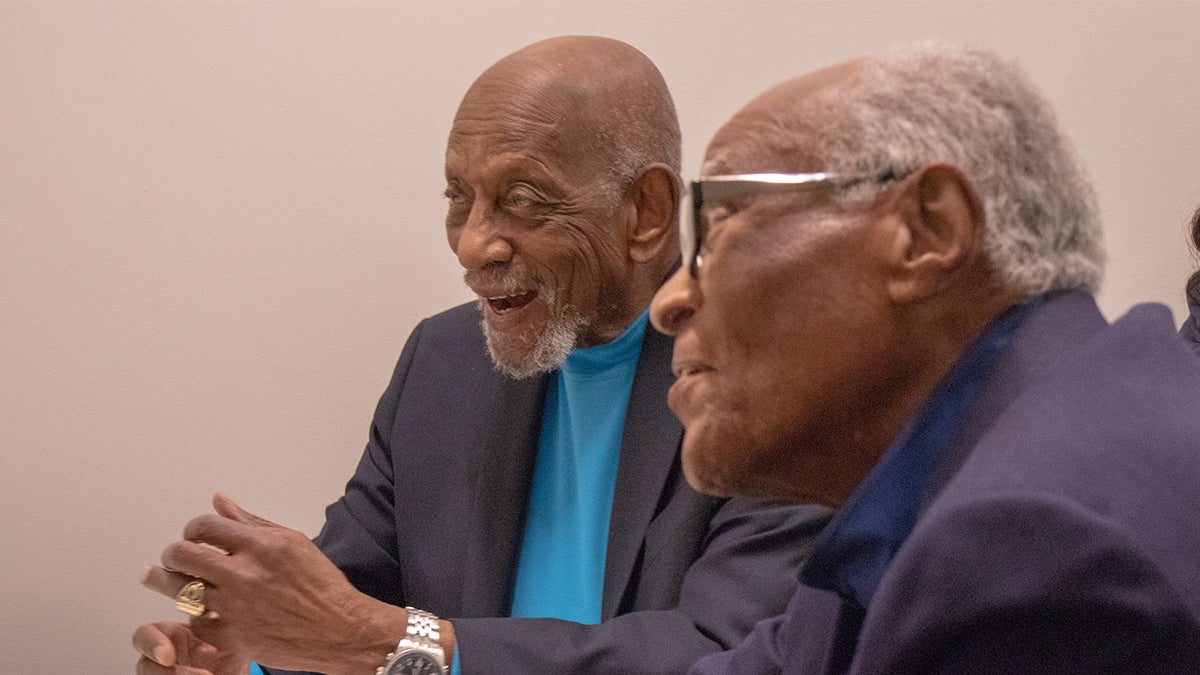Legacy of Jesse Owens, 1936 African-American Olympians continues in new film

PHOENIX— Ask Olympic medalist Herb Douglas just about any question and his answer will get back to the lessons he learned growing up with a father who became blind — the discipline and perseverance necessary to overcome such an intrinsic challenge.

“Education begins in the home,” Douglas will tell you.
The long jumper, who won a bronze medal at the 1948 Olympics in London, began his career at the University of Pittsburgh not long after the legendary Jesse Owens won four gold medals at the 1936 games and inspired a generation of African-American athletes. Today, he continues that education for himself and others by telling the stories of Owens and his teammates, who together changed the face of sport.
In “The Renaissance Period of the African American in Sports,” which Douglas produced alongside filmmaker Bob Lott, those stories come alive. The success of these African-American athletes in the heart of Nazi Germany at the Berlin Games in 1936 put a stake through the fairy tale of racial supremacy. Their athletic performances captured the imagination of the United States at that time and motivated dozens of men and women to pursue sport throughout the mid-20th century. This group ignited an groundswell of African-American success stories, first at the Olympics and soon in every other corner of the professional sports world.
At the film’s screening on Monday night, Douglas told the dozens gathered at Arizona State University’s Beus Center for Law and Society about how Owens, even late in his life, regretted never being awarded the AAU’s James E. Sullivan Award, which went to the best amateur athlete in the United States each year. The inspiration for the film and for continuing to forge ahead with such stories, Douglas said, was to continue the legacy of Owens in ways American society never did.
One man who did win the Sullivan Award is Harrison “Bones” Dillard, who accompanied Douglas to the screening and idolized Owens as a young man. Hailing as Owens did from Cleveland, Ohio, Dillard learned from Owens the meaning of passion and relentlessness in athletics as well as simpler tricks of the trade. Dillard attended the same high school as his idol and learned from the legend to lead with his left leg over the lower hurdles as he turned the corner of the track to maintain speed and balance. Certainly both were talented, the rare track stars to stand out in more than sprints. Dillard followed Owens’ gold-tinged path by winning the top prize in the 100-meter dash, 4x100-meter relay (twice) and 110-meter hurdles over the course of the 1948 and 1952 Olympics.
“Jesse was extremely giving; he was always ready to impart knowledge — how he succeeded, why he succeeded — and at the basis of all of it was just work,” Dillard told GlobalSport Matters. “If the Lord and your parents give you a little bit of talent and you’re willing to put in just a little bit of time and accept the aches and the pains, then you will have every chance of becoming successful.”

Since the era Dillard and Douglas dominated track and field, changes have altered the competitive landscape as well as the sport itself. The low-hurdle event that served as one of Dillard’s most memorable connections to Owens no longer exists, as the smaller 2 ½-foot bars were deemed a “waste of time” by all involved, Dillard said. In addition, the track surface is springier, and hurdle runners know to flex their arms inward when they leap rather than holding them out in front as they did when Dillard and Owens competed.
Of course, across the board, athletes are also taller and bigger (and, in turn, excel as athletes) than they were all those years ago.
“As a result of the athletes being faster, medical knowledge, the training habits are different for the better,” Dillard said.
Aside from the athletic advantages of modern competitors, the Olympians lauded today’s stars for their ability to make enough money to be heard in a major way. As they see it, Owens’ performance spoke for itself, but contemporary athletes’ words carry even greater significance.
“A rich person says ‘I don’t like that’ and it carries a lot more significance, it seems, than just Joe on the corner,” Dillard said.
That power also carries questions of clout and whether simply the privilege of greatness as an athlete brings with it any inherent value to what one says. To that, Dillard said our standards must hold them to righteousness just as they would any other person.
“It gets back to right and wrong,” Dillard said. “They could be black but be just wrong people. That combination is no good, no more so than a billionaire or a Caucasian or some sort of people of a majority background or race. Wrong is wrong, whether it be ‘us’ or whether it be ‘them.’”
African-American athletes gaining more of a voice in the national conversation can also be seen as a change in the numbers game. In Douglas’ experience in the mid-20th century, athletes had to go through white coaches and other superiors to be heard. “Today, there is a lot of difference — not the difference that we think we should have, but there is a big difference in coaching — and civil rights-wise,” Douglas posited, “that’s why it’s changing.” Many of Douglas’ and Dillard’s teammates in those Olympics were world-renowned scholars and professionals across all industries. They chose sport because they were inspired to give it a try by the success of people like Owens and because they loved to compete.
In “The Renaissance Period of the African American in Sports,” the filmmakers show the lives these men and women led after the games. While George Coleman Poage was the first African-American medalist for America in 1904, the group from 1936 became the Da Vincis and Michaelangelos of their time as they broadened horizons for future generations.
Early in the film, Douglas says “we had no idols,” referring to his team’s experience growing up black in America wanting to play sports. Yet in 1936, African-Americans won 55 percent of the United States’ gold medals and changed all of that.
The African-American members of the 1936 team included a future U.S. Congressman, a state representative and a Stanford laboratory administrator, in addition to military leaders and sports coaches.
Dillard was the business manager for the Cleveland City School District and worked as a scout for the Cleveland Indians later in life and remains the only man ever to win gold in both sprints and hurdles.
Douglas went on to become the third African-American to become a vice president of a major corporation, at Schiefflin and Co., a spirits distributor, and visitors to the Pennsylvania Sports Hall of Fame can see his University of Pittsburgh jersey on display. He will tell you his success started all those years ago at his home, where a seeing-eye dog gave his father his life back and allowed his mother to raise young Herb into the athlete and man he would become.
Asked after the film about whether he sees any parallels as an African-American pioneer and that of Colin Kaepernick’s peaceful protests against the treatment of black Americans today within football, Dillard said yes. The quarterback should get another chance if all he did was share his mind peacefully.
After all, Dillard said, “sports have played an instrumental part in making us better.”
Related Articles
Pulling no punches: 14-year-old girl aspires to be first Navajo boxer to win Olympics

